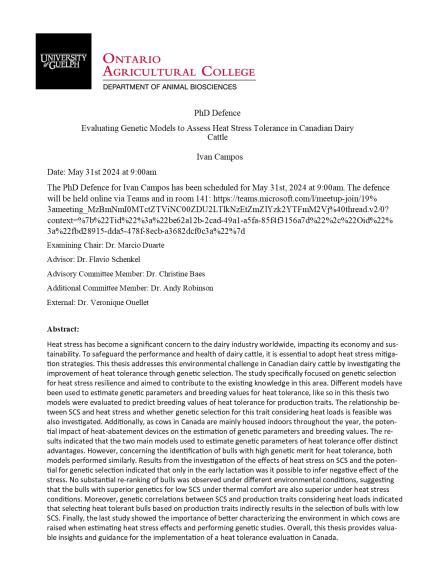Ivan Campos' PhD Defence
Date and Time
Location
Room 141 and Teams: https://teams.microsoft.com/l/meetup-join/19%3ameeting_MzBmNmI0MTctZTViNC00ZDU2LTlkNzEtZmZlYzk2YTFmM2Vj%40thread.v2/0?context=%7b%22Tid%22%3a%22be62a12b-2cad-49a1-a5fa-85f4f3156a7d%22%2c%22Oid%22%3a%22fbd28915-dda5-478f-8ecb-a3682dcf0c3a%22%7d

Details
Title: Evaluating Genetic Models to Assess Heat Stress Tolerance in Canadian Dairy Cattle
Abstract:
Heat stress has become a significant concern to the dairy industry worldwide, impacting its economy and sustainability. To safeguard the performance and health of dairy cattle, it is essential to adopt heat stress mitigation strategies. This thesis addresses this environmental challenge in Canadian dairy cattle by investigating the improvement of heat tolerance through genetic selection. The study specifically focused on genetic selection for heat stress resilience and aimed to contribute to the existing knowledge in this area. Different models have been used to estimate genetic parameters and breeding values for heat tolerance, like so in this thesis two models were evaluated to predict breeding values of heat tolerance for production traits. The relationship between SCS and heat stress and whether genetic selection for this trait considering heat loads is feasible was also investigated. Additionally, as cows in Canada are mainly housed indoors throughout the year, the potential impact of heat-abatement devices on the estimation of genetic parameters and breeding values. The results indicated that the two main models used to estimate genetic parameters of heat tolerance offer distinct advantages. However, concerning the identification of bulls with high genetic merit for heat tolerance, both models performed similarly. Results from the investigation of the effects of heat stress on SCS and the potential for genetic selection indicated that only in the early lactation was it possible to infer negative effect of the stress. No substantial re-ranking of bulls was observed under different environmental conditions, suggesting that the bulls with superior genetics for low SCS under thermal comfort are also superior under heat stress conditions. Moreover, genetic correlations between SCS and production traits considering heat loads indicated that selecting heat tolerant bulls based on production traits indirectly results in the selection of bulls with low SCS. Finally, the last study showed the importance of better characterizing the environment in which cows are raised when estimating heat stress effects and performing genetic studies. Overall, this thesis provides valuable insights and guidance for the implementation of a heat tolerance evaluation in Canada.